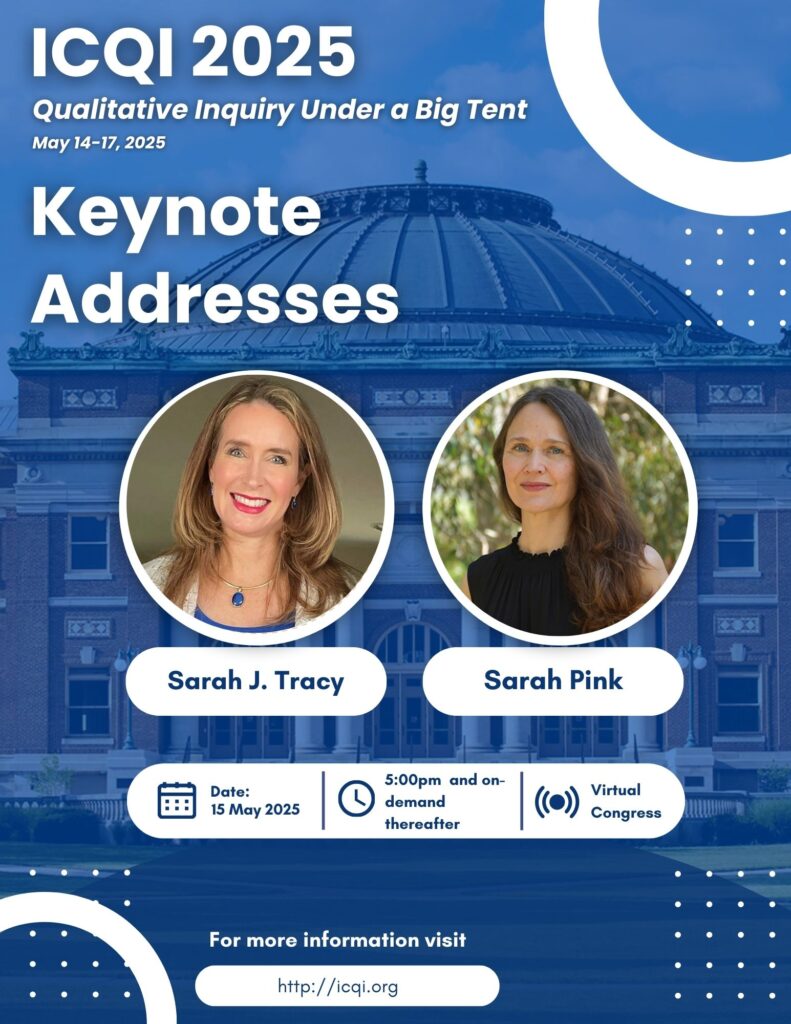
Sarah J. Tracy: Creating a Big Tent to Support the Flourishing of Excellent Qualitative Inquiry Across Paradigms
In a 2008 article about promoting dialogue across paradigms, Norman Denzin boldly proclaimed, “We need to find new strategic and tactical ways to work with one another in the new paradigm dialog. This means we must expand the size of our tent, indeed we need a bigger tent! We cannot afford to fight with one another (Denzin, 2008, p. 321).
Indeed, through his editorship of Qualitative Inquiry and leadership of the International Congress of Qualitative Inquiry (ICQI), he created space for researchers and practitioners across paradigms and disciplines to celebrate, dialogue about, learn, and enrich qualitative research. Although Norman was most passionate about critical qualitative research focused on social justice, his long career found him traveling far and wide across paradigms, experimenting with and learning expansive ways of knowing. Along the way, he became intimately familiar with the expectations and inappropriate quality yardsticks of those who did NOT practice qualitative research. In doing so, he created a place of respite and energy for qualitative researchers to dream otherwise.
I am one of the many beneficiaries of this big tent. In this keynote, I discuss the importance of listening to and learning from a range of qualitative researchers under a “big tent” – as well as the challenges in doing so. In doing so, I share aspects of my own journey of attempting to explain and teach practices that may result in impactful, trustworthy, and resonant qualitative research across paradigms (the Eight Big-Tent Criteria), and the critiques I’ve faced along the way.
It is often more comfortable to stay snugly wrapped in a small community of researchers who share the same ideological beliefs and parallel practices. From a safe cocoon of like-minded and self-congratulating others, it feels easier to shoot barbs and unsubstantiated critiques at those with whom we differ, even when such critiques are uninformed. Of course, if we consider an academic research program as a “game” – it’s certainly easier to “win” when you never travel off your favorite gameboard. However, if we attend to Norman’s wisdom and advice about the importance of dialoging with others, having the vulnerability and curiosity to learn “new games” is vital for supporting impactful qualitative research into the future.
Sarah Pink: Qualitative Futures Research: expanding the temporalities of engaged scholarship
It is increasingly proposed by international organisations that we are experiencing polycrisis, where multiple crises (e.g. economic, climate, geopolitical and technological) converge and lead to deep concerns about futures. In response, there is growing attention to forecasting and foresighting. But where is qualitative futures research?
In this lecture I propose a new movement in qualitative research approaches to investigating, interpreting and understanding possible futures, to enable new layers of qualitative knowledge and ways of knowing in anticipatory, speculative and experimental modes. I briefly explore the layers of knowledge forecasting and foresighting offer, and compare these with that offered by rigorous qualitative inquiry. I then discuss what it means to do futures-focused qualitative research, the status of the knowledge that we can produce and the possible roles of emerging technologies in this endeavour. I then offer a series of examples of methods for investigating and communicating futures knowledge, drawing on ethnographic, design and documentary practice.
Finally, I reflect on the potential outcomes of bringing qualitative knowing into dialogue with forecast and foresight.
Sarah Pink (PhD, PhD h.c x2, FASSA) is an award winning futures anthropologist and documentary filmmaker. Sarah is Laureate Professor and Director of the Emerging Technologies Research Lab and FUTURES Hub at Monash University. Prior to this she was RMIT Distinguished Professor and Director of the Digital Ethnography Centre at RMIT University. Sarah has published widely in the field of qualitative inquiry, including her Doing Visual Ethnography (2021, 4th edition), Doing Sensory Ethnography (2015 2nd edition) and the co-authored Digital Ethnography (2016) and Design Ethnography (2022). Her recent documentaries include Smart Homes for Seniors (2021) and Digital Energy Futures (2022).
